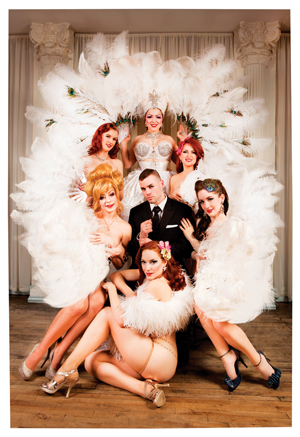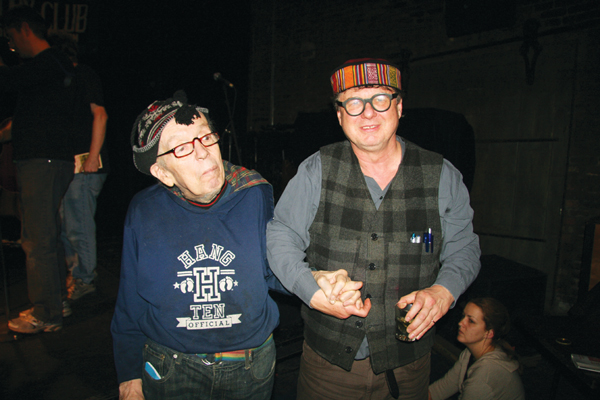
BY LINCOLN ANDERSON | Some might think the Bowery Poetry Club’s scaling back its presence on the Bowery — largely giving way to a swank and sexy new restaurant — is just the latest sign of the famously gritty boulevard’s gentrification.
But to hear both Bob Holman, the poetry club’s founder and proprietor, and the restaurant’s ownership tell it, the space’s new incarnation will be firmly in keeping with the Bowery’s historic identity.
Bowery Poetry Club closed last month and the space, at 308 Bowery between Houston and Bleecker Sts., is now undergoing renovation to become the new home of Duane Park, a Tribeca restaurant featuring nightly live entertainment.
Duane Park’s Web page describes it as “New York Burlesque & Live Jazz,” with the motto, “Always an evening of dreamy elegance, hot dancers, cool jazz or moonlight magic.”
Featured performers on its August calendar include the likes of Jo Boobs, Gal Friday, Hazel Honeysuckel and Stormy Leather.
But the restaurant’s operators stress it’s not fair to pigeonhole it as a burlesque club, since the dancing is just part of what they do.
“Burlesque is mixed in,” explained Billy Melillo, one of the club’s co-owners. “It’s more of a mood.”
Other performers at Duane Park include Albert Cadabra, a.k.a. “The Great Deceiver,” a sideshow-style magician, and Motown-inspired singer Aaron Marcellus, formerly of “American Idol.” Duane Park has even had opera and poetry readings.
The restaurant was started by Marisa Ferrarin four years ago. Melillo soon came in as a partner.
As Melillo explained it, only people in their 20s really go out dancing in clubs nowadays.
“The club scene is totally gone,” said Malilo, who was a part owner of the Sound Factory dance club in Chelsea in 1989 and ’90. “For people in their 30s, 40s, 50s, this is the new nightlife — dinner and a show.”
Duane Park added burlesque to the menu to draw out people after the economy tanked. According to Melillo, it was his idea.
“We actually started it when the stock market crashed,” he said. “Marisa had started the restaurant. We incorporated burlesque into the dining experience.”
At first the exotic-dancing performances were free, with a two-drink minimum. Gradually, they started to build them into part of a larger show. It’s “classic burlesque,” noted Sophie Charlston, the restaurant’s general manager.
However, some think reviving burlesque on the Bowery — its birthplace in America — would be sending the wrong message. On the blog Bowery Gals, K Webster lamented the loss of the full-time Bowery Poetry Club at 308 Bowery, plus expressed concern about bringing in burlesque, calling it “the sexual exploitation of a vulnerable group for the profit of others.” Webster said having burlesque performances while the audience is eating is downright “creepy.”
Melillo disagrees, though he conceded some people are strongly against burlesque.
“A lot of people are — because they think it’s degrading to women,” he acknowledged. However, he noted, more women than men actually come to their burlesque shows, with the ratio sometimes 2 to 1, partly because of the women’s interest in the costumes. All the dancers make their own, he noted.
The dancers come onstage individually, not in a sort of Folies Bergère or Cotton Club extravaganza, he added.
Speaking of performance art, Melillo used to manage Lady Gaga — not as a singer, but when she was 18 and worked as a waitress at Palma restaurant on Cornelia St.
She came to see a show at Duane Park a couple of years ago.
“She’s still the same girl,” he said of Gaga, now 24.
Duane Park will be closing in Tribeca, where its lease is expiring, and will open in the new Bowery space in October or November.
Duane Park isn’t open for business on Sundays and Mondays, so the poetry club will continue to use the space those days, as well as on Saturday afternoons. But Duane Park will be paying the rent, which had been the poetry club’s hurdle.
On Monday, The Villager reached Holman on his cell phone in Wales, where he’s filming a PBS documentary he’s making on endangered languages. He had just finished rehearsing for a performance later that night for the latest installment of what he called “the world’s oldest poetry slam,” which has been held in Wales since 1172 and is called “Stomp.”
His documentary also explores Aboriginal languages in Australia and indigenous languages in Hawaii.
“Half the languages on Earth are supposed to die this century,” he noted.
Holman said his interest in the roots of hip-hop is what ultimately led him to threatened tongues.
Getting back to the poetry club, however, he said, “We had a great 10-year run trying to do it our way as poets. I think the poetry that we’ve done has been amazing and community-oriented. But we haven’t been viable the last few years.”
Holman said the only way the Bowery Poetry Club could have survived as a full-time operation was to be run by “an obsessive — someone who would volunteer their life to make this work.”
When Holman’s wife fell ill several years ago, his caring for her took him away from the poetry club, which added new expenses as he had to pay for others to manage and run the place.
A nonprofit, the poetry club mainly relied on its bar proceeds. About five years ago, it actively started seeking grants, but it still wasn’t enough. Various uses for its front space — from a juice bar to a Lower East Side Girls Club cafe — never quite panned out.
“In the past we just tried to break even,” Holman said. “And they weren’t drinkin’ enough to pay the rent. … They say you can’t go broke running a bar in New York — but we gave it a run.”

As for the deal with Duane Park, the papers still aren’t signed, but Holman said he expected that would happen this week.
He said the plan “passed a hurdle” recently when they got a “C of O” — a certificate of occupancy for the whole building — as well an assembly permit.
On the liquor license, he said the hope is that the poetry club’s license would be extended to include Duane Park, without the restaurant having to go through a completely new application.
“They have a really nice menu,” he said of Duane Park’s “modern American”-style fare.
The restaurant offers brunch and dinner, with dinner entrees such as bacon-wrapped trout ($23) and herb-crusted leg of spring lamb ($24).
The Friday and Saturday jazz-and-burlesque shows include a three-course dinner, all for $75 (drinks and tip not included).
Holman described Duane Park’s programming as “contemporary vaudeville and burlesque — and poetry readings.”
“Marisa — her shows are right in line with the feel of the old Bowery,” he said, adding, “It’s also representative of the new Bowery.
“She’s one of the world’s great hosts,” he said of Ferrarin. “It’s like Elaine’s the way she runs the place. It’s going to be a potpourri of arts — populist entertainment.”
He called the $75 show price “reasonable” when compared with other upscale entertainment-and-dining venues, such as the B.B. King club on W. 42nd St.
Meanwhile, the Bowery Poetry Club will continue to offer a “free open mic and $3 P.B.R.,” Holman said.
The poetry club won’t have to put on 30 to 35 shows per week like before to try to make ends meet, though. Instead, it will probably do up to 10 shows at 308 Bowery weekly.
The plan is to “still have it be a safe space for creativity, poetry, Occupy Wall Street, Faceboy and Rev Jen,” Holman explained of how the space will be used on Saturday afternoons, Sundays and Mondays.
The poetry club will also benefit from the place’s renovation, he noted, calling the new décor a “New Orleans, turn-of-the-century, rococo setup inside.”
For other shows that can’t be accommodated there, he said, he’s hoping to use the upstairs space at 45 Bleecker St. as a sort of satellite location. The POEMobile is also taking the poetry club’s mission on the road around the city.
Realizing he couldn’t operate the poetry club as a one-man show, he has hired Jamie Tannenbaum as executive director and David Brouillard as managing director.
Holman will return in the fall to help celebrate Bowery Poetry Club’s 10th anniversary. He’s planning an “endangered language series,” the first of which will include poetry in Garifun (a hybrid of Arawak and African dialects) and Breton.
To those who blast burlesque as sexist, Holman responded, “Feminism is going through all of its growth changes. I certainly respect the feelings. I just have been hanging around this part of the world long enough to know that people like Chi Chi Valenti and the World Famous Bob — not me,” he quipped, referring to the burlesque artist. “I know the show Chi Chi does at the end of HOWL! is always a highlight for me. I just see it as part of the fabric of the neighborhood.
“I have heard from women that it can be a liberating experience,” Holman added of the dance form.
More to the point, the type of entertainment Duane Park offers is an integral part of the Bowery’s history.
“Burlesque, vaudeville were born on the Bowery,” Holman said. “The ‘penny dreadful museum,’ punk, CBGB — the Bowery is home of the populist arts. It’s great that the Bowery Mission, B.R.C. [Bowery Residents’ Committee] are not being run off as the big gentrifiers come in. The Bowery Poetry Club holds down a position of the populist tradition of the Bowery. It’s 2012, folks — and this is what the Bowery looks like.”
Jim Flynn, 34, a public school teacher, writer and performer who lives in the East Village and enjoys the Bowery Poetry Club, is hopeful things will work out under the new setup.
“It’s a good place to try out new material for storytelling. My feeling is it’s a good place to talk with other artistic-minded people,” he said of the poetry club. “I’m sure that Bob has to do what he has to do to keep the place open.”
And who knows? he said, the new partnership “might provide some diversity.”
An earlier version of this article incorrectly said that Bowery Gals blogger K Webster, in writing about Duane Park coming to the Bowery Poetry Club space, had called burlesque “sexist and demeaning.” In fact, what Webster wrote is that burlesque uses “female bodies as commodities” and represents “the sexual exploitation of a vulnerable group for the profit of others.” She characterized Duane Park and business like it as “enterprises…with a posh veneer that cash in on exposing women’s bodies for profit.”


































